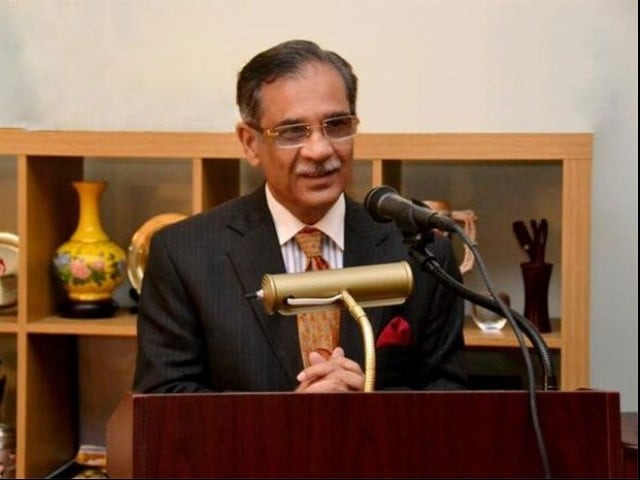CJP forms joint task force to end illegal encroachments
Justice Nisar chides mayor for making Pakistan Quarters evictions an ethnic issue

Chief Justice of Pakistan Mian Saqib Nisar. PHOTO: EXPRESS
A three-judge bench, headed by Chief Justice of Pakistan Mian Saqib Nisar and comprising Justice Musheer Alam and Justice Muneeb Akhtar, was hearing the case regarding the illegal occupation of parks and public land.
As Mayor Waseem Akhtar stood before the bench, CJP Nisar questioned why he wanted to stir ethnic strife in the city. "Here, no one is Punjabi or Muhajir. We are all Pakistanis," he remarked, adding that should someone who was illegally occupying land be spared.
Encroachments hamper traffic in Rahim Yar Khan
The CJP then inquired if the mayor had implemented the court's orders. "You took me to the drains and said they will be cleaned. Have they been cleaned?" he asked the mayor.
Akhtar replied that the Karachi Metropolitan Corporation (KMC) had removed encroachments from parks and demolished illegal marriage halls. "We're taking action and now that the control is with me, work is being done," he told the court.
Justice Musheer Alam remarked that encroachments were still present on either side of Jahangir Park. "You've handed over Saddar to the transport mafia. The area is in bad shape," he said.
To this, the mayor said that Saddar was a cantonment area and that he had no jurisdiction to take action there. The CJP remarked that if there'd be no law, the rule of the powerful would prevail. "Who broke the law?" he questioned, adding that development wasn't possible without upholding the supremacy of the law.
The mayor again pleaded that he didn't have authority and that only the police was cooperating.
The CJP remarked that when they wanted to end illegal occupations, the mayor made a human issue. "We need to find a solution for this that does not cause suffering to the poor," said the CJP. "The pushcarts sitting on footpaths must also be adjusted somewhere else. This is the responsibility of the state," he said, adding that Saddar should be cleaned up and made a model area.
A journalist present during the hearing told the court that mafias had taken over the transport system of Karachi, especially the parking areas. "I challenge the administration to clean up Saddar in a month," he said.
CJP Nisar responded that when the court ordered action, journalists turned their sympathies to the people being evicted and showed them as victims on television.
Top court set to hear NAB appeals against Sharif family
The court inquired from the mayor if he would take action. Akhtar responded again that he did not have the authority to take action in Saddar.
The CJP remarked that a joint team should be constituted comprising all stakeholders to put an end to encroachments once and for all. He ordered the formation of a joint taskforce and summoned the Sindh Police chief, Rangers Director-General, Karachi Mayor, representatives of cantonment boards and other relevant authorities to appear before the court today (Saturday) for further direction.
Illegal parking
The same bench summoned the Sindh Police chief and Sindh Building Control Authority DG over illegal parking in commercial buildings and encroachments on main roads.
The petitioner, Advocate Uzma Saeed, had noted in her petition that encroachments were made on main roads by placing containers to make space for parking.
The petitioner observed that the parking spaces in over 38,000 commercial buildings had been illegally occupied. Due to these illegal occupations, the city's traffic woes had increased manifold.
The petitioner told the court that Zainab Market and Hashmi Center were among 80 buildings whose parking spaces had been converted into warehouses. She added that SBCA authorities had failed in their responsibilities. Several lanes on MA Jinnah Road, too, had been blocked by placing containers due to which the common man is suffering.
The CJP remarked that some roads had been blocked for security reasons. The court summoned the Sindh IG and SBCA DG for a response.
Mineral water companies case: SC summons all four chief secretaries
Water commission
The Supreme Court expressed its satisfaction with the performance of the Judicial Commission on Water and Sanitation, hinting at the possibility of an extension in the commission's tenure.
The bench was hearing the case regarding the provision of clean water in Sindh. The CJP, terming the commission's performance satisfactory, said that its tenure was to end on January 15, but it could be extended, adding that he would take into account the opinion of the commission's members before taking any such decision.
"I will meet Hani so that his view can be known," said the CJP, before adjourning the hearing till next month.
During the hearing, a petitioner, Amjad Pervez, said that court's orders regarding tall buildings were being violated. The CJP remarked that permission has been given to construct no more than six storey buildings.
"Do you want me to give you permission to construct 45 storey buildings?" he questioned the builders' representatives present at the hearing. "Gutters are flowing, there is no water and you want me to give you permission?" he questioned.
Published in The Express Tribune, October 27th, 2018.



















COMMENTS
Comments are moderated and generally will be posted if they are on-topic and not abusive.
For more information, please see our Comments FAQ